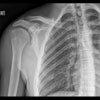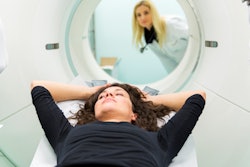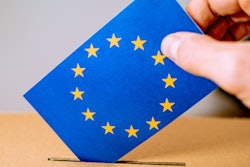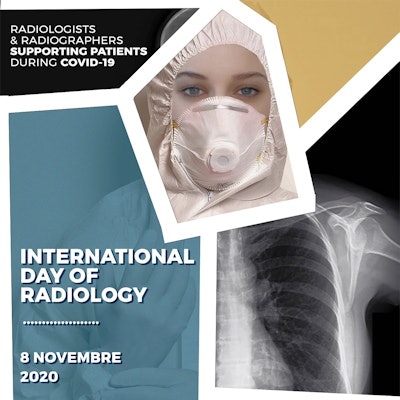
COVID-19 has defined 2020, so it was understandable that Sunday's International Day of Radiology (IDoR) paid tribute to all the radiologists, radiographers, and support staff around the world who have worked hard throughout the pandemic. Imaging teams came together to raise awareness and celebrate the vital role of radiology, as well as to reflect on how the profession has changed this year.
"In challenging times like these, hope can be a powerful force for change and a compelling source of reassurance. The tireless and tremendous efforts and dedication of medical staff in fighting the pandemic gives everyone hope," stated the organizers of the IDoR, conceding that COVID-19 has had a wide-ranging impact across all areas of healthcare delivery, including radiology.
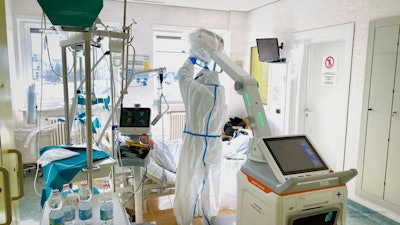 This photo from a hospital in South Tyrol, Italy, shows the level of care and protection now required by a radiographer to perform a normally straightforward x-ray examination. All photos courtesy of the IDoR.
This photo from a hospital in South Tyrol, Italy, shows the level of care and protection now required by a radiographer to perform a normally straightforward x-ray examination. All photos courtesy of the IDoR.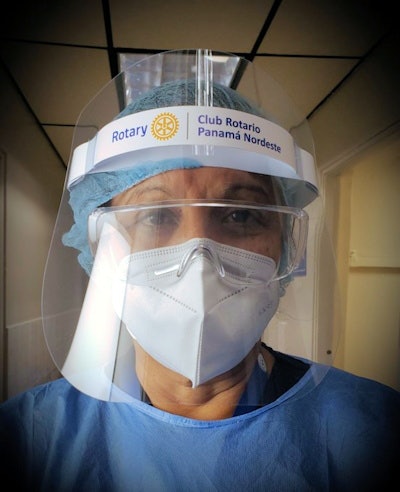 Radiology has come a long way in terms of making optimum use of personal protective equipment (PPE), as this picture from the Panamanian Society of Radiology and Images shows.
Radiology has come a long way in terms of making optimum use of personal protective equipment (PPE), as this picture from the Panamanian Society of Radiology and Images shows.Diagnostic imaging expertise has helped triage and manage patients, and interventional and trainee radiologists have been routinely redeployed to the COVID-19 front line, noted a press statement issued by the U.K. Royal College of Radiologists (RCR) on 8 November. Hospitals have had to adapt patient pathways and implement new infection control protocols to image and treat all patients safely, and the pandemic has had a major impact on radiology training schemes.
"COVID-19 has represented change, in all we do and how we do it," stated Prof. Mark Callaway, RCR's medical director for professional practice. "From the virtual nature of meetings and multidisciplinary team sessions, to the full PPE required for interventional cases, it is a very different clinical world now from the one that began in January."
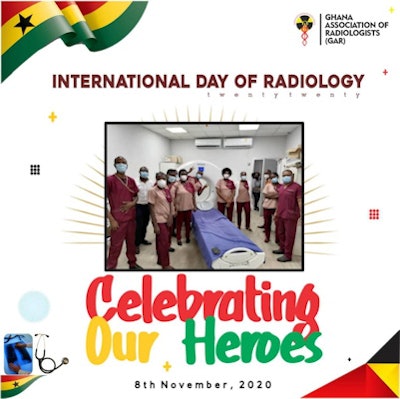 Members of the Ghana Association of Radiologists got into the spirit of the occasion.
Members of the Ghana Association of Radiologists got into the spirit of the occasion.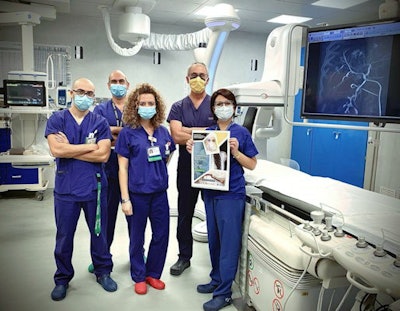 The Italian Federation of Radiographer Societies created a poster for their IDoR 2020 celebrations.
The Italian Federation of Radiographer Societies created a poster for their IDoR 2020 celebrations.The pandemic has also demonstrated that not all change should be resisted; home reporting, using a webinar format for a trainee masterclass, and lecturing early one morning to a conference in India have all been positive experiences for him, he said. "COVID-19 has also stressed the vital importance of human contact and talking to colleagues."
Free COVID-19 course
To coincide with IDoR 2020, the European Society of Radiology (ESR) has collected all COVID-19 related lectures on ESR Connect and is making them available free of charge for a period of two weeks. The course is available from 6 to 20 November.
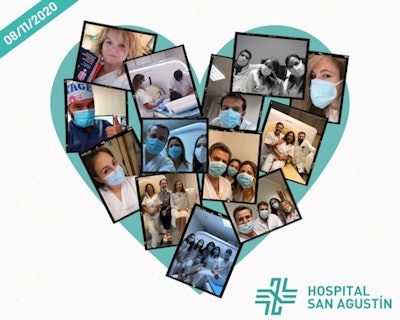 Showing their love for radiology, staff at Hospital San Agustín - La ORL, Dos Hermanas, near Seville, Spain, shared a collection of photos of the imaging team.
Showing their love for radiology, staff at Hospital San Agustín - La ORL, Dos Hermanas, near Seville, Spain, shared a collection of photos of the imaging team.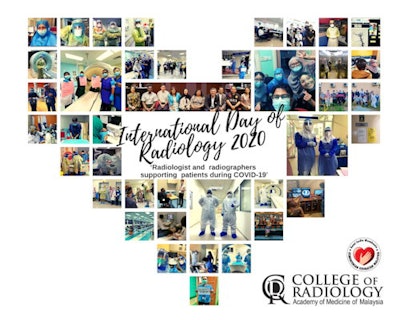 The College of Radiology, Academy of Medicine Malaysia, produced a special momento for the IDOR.
The College of Radiology, Academy of Medicine Malaysia, produced a special momento for the IDOR."The radiologist is important to me because I am living with a chronic disease and need information," noted Birgit Bauer, chairperson of the ESR Patient Advisory Group, in a statement posted on 8 November. "I want to see him face to face if possible, and appreciate having a discussion with him too."
Radiologists are also important partners for patients and need to be visible in their health team, she continued.
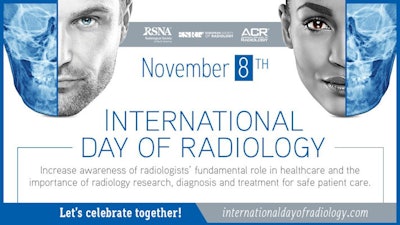 The RSNA designed an eye-catching poster for the IDoR 2020.
The RSNA designed an eye-catching poster for the IDoR 2020.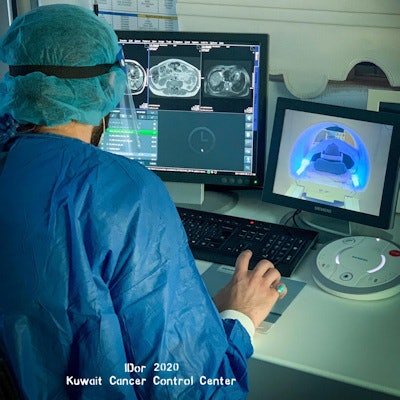 Imaging professionals at the Kuwait Cancer Control Center, a 200-bed hospital complex located in Shuwaikh, participated in the IDoR.
Imaging professionals at the Kuwait Cancer Control Center, a 200-bed hospital complex located in Shuwaikh, participated in the IDoR.ESR tweeted: "Why do we celebrate IDoR on Nov 8 each year? Because Wilhelm Röntgen produced electromagnetic radiation in a wavelength range known as x-rays on this day 125 years ago. Thanks to him radiology was born. The world has benefitted from this amazing discovery ever since."
In Germany, the University of Würzburg held a ceremonial event on 8 November. Called "Wilhelm Conrad Röntgen -- 125 years of new insights," it celebrated the work of the university's first Nobel Prize winner.
Prof. Klaus von Klitzing, the Nobel Prize-winning physicist from the Max Planck Institute for Solid State Research, gave the keynote speech under the title of "Wilhelm Conrad Röntgen -- On the trail of the first Nobel Prize winner."
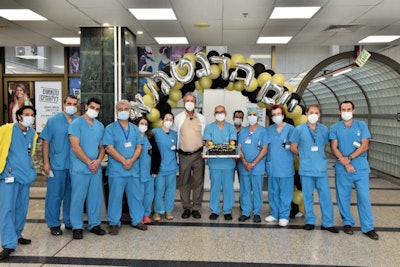 Bake off: Staff at Galilee Medical Center, located in the coastal city of Nahariya and the second largest hospital in northern Israel, baked a cake for the IDoR.
Bake off: Staff at Galilee Medical Center, located in the coastal city of Nahariya and the second largest hospital in northern Israel, baked a cake for the IDoR.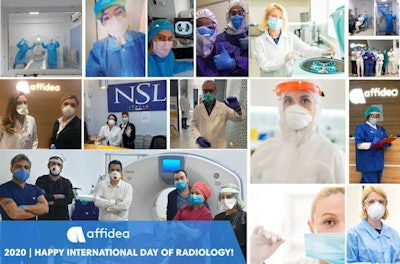 Employees at Affidea's network of imaging, outpatient, and cancer care centers across Europe were in a celebratory mood.
Employees at Affidea's network of imaging, outpatient, and cancer care centers across Europe were in a celebratory mood.You can find out more from the IDoR website.


